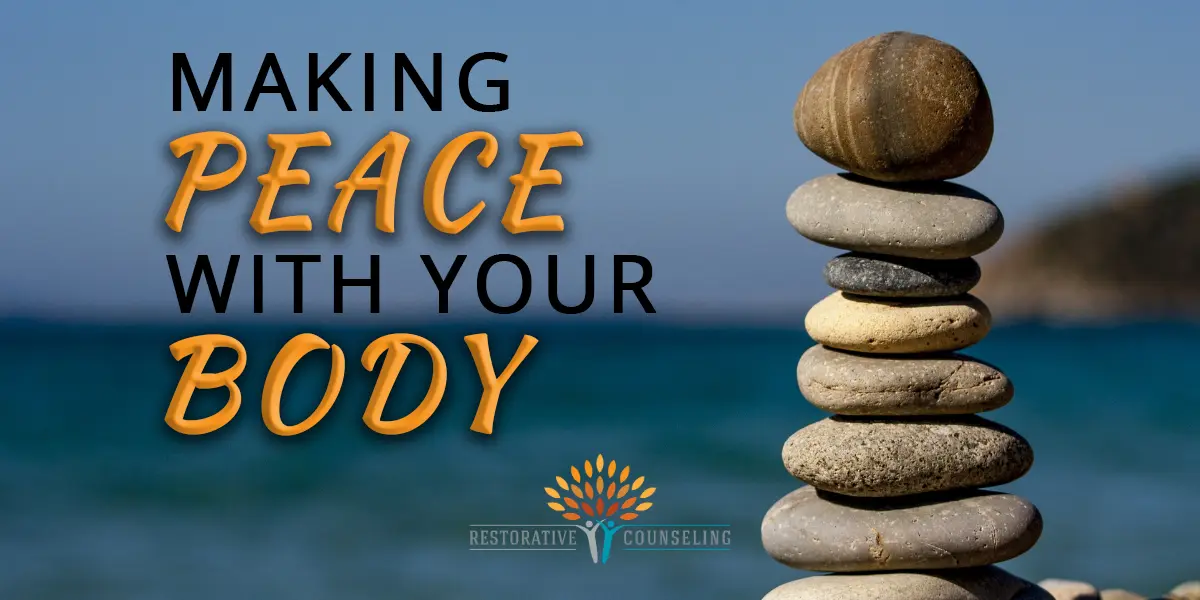Written by Katie Jackson-Griffin, LCPC
A journey from negative self-talk toward a positive body image
Luis has been feeling lonely while living by himself. What once was a source of joy to him to have alone time, has caused so much isolation during the pandemic. Thus, he decides to get back into dating. But whenever Luis gets back onto the dating apps, he can’t help but compare himself to others’ profiles. As he looks at his photos to upload, all he can focus on is how his stomach is too big and how his arms don’t have enough muscle definition. “I’ll never attract a partner if I look like this”, he thinks to himself. Luis feels a lack of peace with his body.
As a result, Luis decides to go on a diet and exercise more. He starts counting calories and running every day. At first, Luis feels great! He’s got a plan. But as time goes on, he finds himself obsessed with food. He daydreams about how he can “save up” his calories to have a meal that he has been wanting. When he is too tired to keep running every day, he puts himself down. Luis notices that his body isn’t changing the way that he wants and he thinks that it is all his fault. All this time, he hasn’t been using the dating apps because he wants to “just look a little better first” before uploading any photos. He’s no closer to finding a partner. Luis feels stuck.
There is constant pressure to fit an “ideal body type.” Perhaps this is a familiar experience for you.
There is so much pressure in society to look a certain way. Constant messaging from a variety of sources tells people what it takes to attract a partner. Many headlines in articles and magazines promise that if you just do a few of their tips, you’ll have the body that will bring you happiness. However, this is truly just an attempt to gain business. Christy Harrison, the author of the book Anti-Diet, cites that in 2019 a research firm called Marketdata reported that the diet industry is worth $79 billion. Clearly, it is very lucrative to convince people that they need to change their bodies in order to be happy.
Unfortunately, there have been countless studies that show that diets don’t work. Harrison reports in her book that a 2015 large-scale study found that anywhere from 95% – 98% of participants gained back all the weight they lost within five years of starting their diet. So why do people keep fixating on changing their bodies to gain happiness?
Control can be a comforting feeling. When a person believes they can control the outcome of something – like dating – they fail to see what is actually outside of their control. The concept of dieting feeds into this belief. Thus, the cycle of dieting causes people a sense of shame when they don’t experience the outcomes that they want. As shame sets in, it becomes even harder to pursue one’s goals that require being vulnerable, such as dating or finding a new job.
Get support in creating inner peace!
Contact Us
Here is how you can break free of the cycle and start practicing body positivity:
1. Control your environment and reduce diet-culture messaging.
Take notice of your social media feeds and the content that you are watching (TV, movies, etc.). If something is emphasizing diet culture and certain body ideals, remove it from your life. With everything being so integrated online these days, you may need to report that you don’t like certain ads on your social media pages so that you stop getting these messages. The more that you steer toward positive body messages and anti-diets, you’ll notice that it feels easier to resist the urge to change your body.
2. Start with neutral thinking.
Neutral thinking is the practice of acknowledging a situation, regardless if it has a positive or negative situation, and accepting it with a neutral mindset. Stay neutral when it comes to your body. Focus on observing it instead of using labels. If you notice that you’re thinking, “My stomach is too big”, shift that to, “I see my stomach there”. This will help you practice reducing the negative thinking that you’ve grown so accustomed to.
3. Shift to thoughts about utility.
Think about what your body can do for you. Instead of having the thought, “My thighs are too big”, shift that to, “My thighs allow me to walk around”. When you’re concerned about your stomach size, focus on what it gives you such as, “My stomach breaks down food to allow me to be nourished throughout the day”. The value of bodies is not about how they look! They serve a very important functional purpose. It is helpful to recognize this value in order to protect your self-esteem.
4. Move towards gratitude and self-love.
Once you have completed the steps of observation and utility, you’ll be more able to give your body appreciation. For example, not only do you notice that your stomach allows you to be nourished, you can be thankful for this! It can be a powerful experience to place your hands on your stomach and repeat grateful phrases.
You don’t have to go through this alone.
With the support of a therapist, Luis is able to work on identifying how his negative thinking about his body was getting in the way of him pursuing finding a partner. He has been improving his ability to make peace with his body and shift his anger toward the diet culture system that was making him feel ashamed. He and his body are worthy of love!
Making peace with your body can be hard. It’s okay if you need some guidance and help with changing the relationship that you have with your body. Restorative Counseling is here to support you! To get started on your journey, schedule an appointment today.
Reference:
Harrison, C., 2019. Anti-Diet: Reclaim Your Time, Money, Well-Being and Happiness through Intuitive Eating. New York: Little, Brown Spark.

Hi, I’m Katie!
I use HAES and DBT approaches to help people overcome their challenges with low self-esteem, anxiety, and depression. Read more about me.
Follow Restorative Counseling
Sign up for our newsletter

